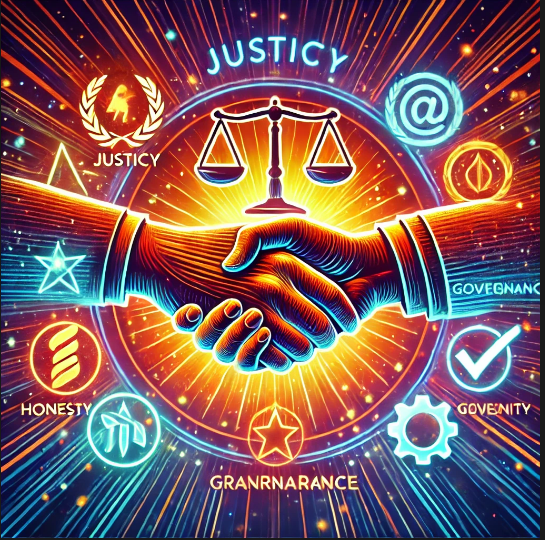Introduction
Corruption is a deep-rooted social evil that hinders economic growth, weakens institutions, and erodes public trust in governance. It manifests in various forms, including bribery, embezzlement, nepotism, and abuse of power. To combat corruption effectively, a multi-pronged approach involving the government, businesses, civil society, and individuals is necessary. This document outlines practical steps to prevent corruption and promote integrity within society.
1. Strengthening Legal Frameworks and Enforcement
A robust legal framework is fundamental to combating corruption. Strict laws should be enacted and effectively enforced to deter corrupt practices.
Key Actions:
- Implement stringent anti-corruption laws with severe penalties for offenders.
- Strengthen judicial independence to ensure impartiality in corruption cases.
- Establish fast-track courts to expedite corruption trials.
- Enforce asset declaration requirements for public officials.
- Ratify and comply with international conventions like the United Nations Convention Against Corruption (UNCAC).
Example:
Singapore’s Corrupt Practices Investigation Bureau (CPIB) has significantly reduced corruption through stringent laws and active enforcement.
2. Promoting Transparency and Accountability
Transparency and accountability are crucial for preventing corruption in both the public and private sectors.
Key Actions:
- Implement the Right to Information (RTI) Act to ensure public access to government records.
- Establish independent anti-corruption commissions to monitor government activities.
- Mandate public disclosure of political donations and election funding.
- Promote e-governance to reduce human intervention in service delivery.
- Encourage whistleblower protection programs to expose corrupt activities without fear.
Example:
Estonia’s e-governance system minimizes human discretion, reducing corruption opportunities in government services.
3. Strengthening Institutions and Good Governance
Strong institutions are essential in fighting corruption and maintaining ethical governance practices.
Key Actions:
- Develop merit-based recruitment and promotions in public services.
- Strengthen the independence of anti-corruption agencies.
- Encourage ethical leadership in political and business sectors.
- Implement internal auditing and financial monitoring mechanisms.
- Decentralize power to prevent the concentration of authority in a few hands.
Example:
Denmark’s robust institutional framework ensures accountability and integrity in governance, making it one of the least corrupt countries globally.
4. Encouraging Ethical Education and Public Awareness
Building a culture of integrity starts with education and awareness campaigns.
Key Actions:
- Integrate ethics and integrity education into school and university curricula.
- Conduct public awareness campaigns highlighting the negative impacts of corruption.
- Encourage media to investigate and report corruption cases.
- Organize community engagement programs to promote ethical behavior.
- Foster corporate ethics training in business organizations.
Example:
Transparency International runs global campaigns to raise awareness about corruption’s impact and solutions.
5. Strengthening the Role of Civil Society and Media
An active civil society and a free press are vital in holding governments and corporations accountable.
Key Actions:
- Support investigative journalism to uncover corruption.
- Strengthen NGOs and advocacy groups working on anti-corruption initiatives.
- Facilitate open forums and discussions on governance and integrity.
- Mobilize citizen participation in monitoring public projects and expenditures.
- Promote the use of digital platforms to report corruption anonymously.
Example:
India’s Association for Democratic Reforms (ADR) monitors political funding and raises public awareness about corruption.
6. Enhancing Corporate Integrity and Ethical Business Practices
The private sector plays a significant role in reducing corruption through ethical business conduct.
Key Actions:
- Enforce corporate governance codes that emphasize transparency and accountability.
- Implement strict anti-bribery policies in businesses.
- Encourage companies to join anti-corruption initiatives like the UN Global Compact.
- Promote fair competition and discourage monopolistic practices.
- Strengthen financial reporting and auditing in corporations.
Example:
Companies like Unilever and Tata Group have strong ethical frameworks, discouraging corrupt practices within their business structures.
7. Leveraging Technology to Reduce Corruption
Technological advancements can help minimize corruption by reducing direct human interactions and increasing accountability.
Key Actions:
- Implement blockchain technology for transparent record-keeping.
- Expand the use of digital payments to reduce bribery in transactions.
- Develop AI-powered systems to monitor government procurement and expenditures.
- Utilize online portals for public grievances and complaints against corruption.
- Adopt biometric authentication to prevent identity fraud in social schemes.
Example:
India’s Aadhaar biometric system has reduced fraudulent beneficiaries in welfare schemes, saving billions in public funds.
8. Encouraging Whistleblower Protection and Reward Systems
Whistleblowers play a crucial role in exposing corruption, but they often face retaliation.
Key Actions:
- Strengthen whistleblower protection laws.
- Provide financial rewards for reporting corruption cases.
- Ensure anonymity and safety for informants.
- Establish independent hotlines for corruption reporting.
- Encourage companies and government agencies to create internal whistleblowing mechanisms.
Example:
The U.S. Securities and Exchange Commission (SEC) Whistleblower Program offers financial incentives to individuals who report corporate fraud.
9. Reforming Political and Electoral Systems
Political corruption is one of the biggest challenges in governance, requiring substantial reforms.
Key Actions:
- Implement state funding of elections to reduce reliance on corporate donations.
- Cap election expenditures to prevent undue influence.
- Strengthen laws to prevent the misuse of public resources during elections.
- Mandate asset disclosures for politicians.
- Establish independent election commissions to monitor campaign financing.
Example:
Germany’s transparent political funding laws prevent corporate lobbying from influencing political decisions.
10. Strengthening International Cooperation
Corruption often involves cross-border transactions and illicit financial flows, requiring global efforts to combat it.
Key Actions:
- Strengthen international treaties on anti-corruption.
- Cooperate in extradition and prosecution of corrupt individuals.
- Encourage financial institutions to prevent money laundering.
- Share best practices and technological advancements in corruption prevention.
- Establish international watchdog organizations to monitor compliance.
Example:
The Financial Action Task Force (FATF) sets global standards to combat money laundering and corruption.
Conclusion
Preventing corruption requires a comprehensive strategy involving legal, institutional, technological, and societal reforms. By promoting transparency, accountability, ethical education, corporate integrity, and technological innovations, societies can reduce corruption and build a more just and equitable system.
Governments, businesses, and citizens must collaborate to create a corruption-free society where integrity, fairness, and justice prevail.




